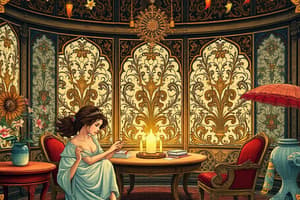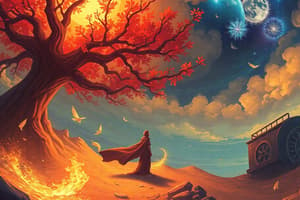Podcast
Questions and Answers
What is the main purpose of tragedy in drama?
What is the main purpose of tragedy in drama?
- To depict the downfall of a protagonist (correct)
- To entertain through humor
- To provide a critique of society
- To create an experimental style
Which type of drama is characterized by humor and a happy ending?
Which type of drama is characterized by humor and a happy ending?
- Experimental
- Satire
- Tragedy
- Comedy (correct)
What is the peak of the rising action in a play called?
What is the peak of the rising action in a play called?
- Climax (correct)
- Exposition
- Denouement
- Falling Action
How are short stories typically characterized in terms of word count?
How are short stories typically characterized in terms of word count?
What is a key difference between novels and short stories?
What is a key difference between novels and short stories?
What element is commonly used in satire to convey its message?
What element is commonly used in satire to convey its message?
In drama, who opposes the main character?
In drama, who opposes the main character?
Which of the following is a defining feature of novellas compared to novels?
Which of the following is a defining feature of novellas compared to novels?
What is the primary distinction between fiction and poetry?
What is the primary distinction between fiction and poetry?
Which of the following statements accurately describes the term 'literature'?
Which of the following statements accurately describes the term 'literature'?
What is a key characteristic of poetry compared to other literary forms?
What is a key characteristic of poetry compared to other literary forms?
How can literature be classified based on its structure?
How can literature be classified based on its structure?
What role does 'diction' play in literature?
What role does 'diction' play in literature?
What is an essential element found in all forms of literature?
What is an essential element found in all forms of literature?
Why is it important to understand different literary genres?
Why is it important to understand different literary genres?
Which of the following best describes the origin of the word 'poetry'?
Which of the following best describes the origin of the word 'poetry'?
Flashcards are hidden until you start studying
Study Notes
What is Literature?
- Literature encompasses any written work, including spoken or sung texts.
- Writing is considered literature when it possesses literary merit.
- Literature is categorized as fiction or non-fiction, and poetry or prose.
- Major literary forms include the novel, short story, and drama.
- Works are often categorized by historical periods, aesthetic features, or genre.
Major Genres in Literary Works
- The main literary forms are Fiction, Drama, and Poetry.
- All genres share common elements like diction (word choice), imagery, and tone.
- Theme, the larger meaning(s) derived from the work, is a crucial element across all genres.
- Each genre is distinguished by its form: Fiction is written in sentences and paragraphs, poetry in lines and stanzas, and drama in dialogue.
Why is Knowing Literary Genres Important?
- Specialized vocabulary is needed to understand, interpret, and write about different forms of literature.
- The approach to a literary text differs depending on its form.
- Fiction and drama usually focus on character engagement, while poems may not have characters or tell a story.
- Plot is often not a factor in poetry.
- Poems can express impressions or reflections about people, places, experiences, or ideas.
Poetry
- Poetry is the imaginative awareness of experience expressed through meaningful, sound, and rhythmic language choices to evoke an emotional response.
- While some poems use meter and rhyme, it's not necessary.
- The term "Poetry" originated in the late 14th century, derived from the Greek "Poetica," which comes from the verb "poiein" meaning "to make."
Drama
- Drama is a genre that encompasses various types, including Tragedy, Comedy, Satire, Experimental, and Musical.
- Plays are organized into dialogue, scenes, and acts.
- Plays can have one act or multiple acts, divided into scenes with characters entering and exiting the stage.
- Plays can feature one character or multiple characters, with the main character being the protagonist and the opposing character being the antagonist.
- The plot of plays typically follows a pattern: Rising Action, Climax, Falling Action.
Fiction
- Short stories are typically between 2000-6000 words long, with at least one developed character and possibly many simpler characters.
- Short stories focus on one major conflict and usually take place within a specific time period.
- Novellas are between 50-150 pages long, in between stories and novels.
- Novels have no prescribed length, allowing authors more freedom with plot and characters.
- Characters can change and develop over time, and themes can be more intricate than in shorter forms of fiction.
Studying That Suits You
Use AI to generate personalized quizzes and flashcards to suit your learning preferences.



